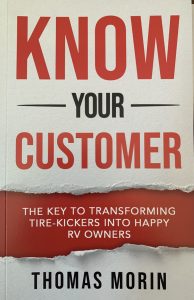Blog: Know Your Customer: Part 2 of Know Their Type
 Morin
MorinEditor’s note: This is the fourth in a four-part blog series (and the second of a two-part installment related to Know Their Type) taken from author and career coach Thomas Morin’s book, “Know Your Customer: The Key to Transforming Tire-Kickers into Happy RV Owners”.
It’s common knowledge that people buy from salespeople they like and trust. However, one thing often missed is that customers will tend to like and trust their salesperson much more quickly if they’re perceived to be like them.
Achieving this takes a sharp eye, good listening skills and quick adjustments on the part of the salesperson. In short, they need to be a bit of a chameleon. They need the ability to change quickly and subtly, without sacrificing process and without the customer noticing.
Once they determine whether their customer’s personality type is Analytical, Driver, Amiable or Expressive, they need to adjust how they communicate to a style that the customer can more comfortably relate to.
Salespeople have a natural style as well, and this is more of an issue when their natural communication style doesn’t match that of their customer. The customer isn’t going to change who they are, so the salesperson must be ready to adjust.
Here’s a quick review of the different style tendencies a salesperson should look for to get identify the customer in front of them:
The Analytical Customer
Analytical customers tend to dress in conservative clothing, typically not very trendy. They will speak quietly, with precision and facts. They will be prepared with specific questions, as they will have done loads of research before coming in and expect the answers to be the same.
If they ask a question and you don’t know the answer, you must say so, but then you must go and get it. You must be precise and factual in the answer. Analyticals also like proof and things in writing because they will dive into it later and read every word.
The Driver
Often managers or leaders, Drivers will be dressed in bold, attention-getting colors, with a strong handshake when meeting them. They are cut and dry, direct and to the point. Their demeanor can be blunt and at times, impersonal. They are quick to judge, make decisions and will look you right in the eye.
They are no-nonsense people and that’s exactly the way to deal with them. They will respect honesty and directness, but do not get in a power struggle with them, because they like to win.
Amiable
Amiable customers dress in warm, bright colors with sparkling jewelry and accessories to reflect their mood and personality. They are nice to deal with because they are warm, caring, and supportive people.
It will be easy to get them to be open because they love to talk, but with a slower, softer speech. They tend to be hard to sell to because, although they are talkative, they won’t always tell you exactly how they feel. Getting them to decide to buy is even harder, as they will go to any lengths to avoid decision-making – and especially conflict.
The Expressive
All customers are important, but the Expressive typically represents the largest group you will have as a customer. They’re easy to spot, because they’re outgoing, enthusiastic and quickly announce their intentions.
They like to have a grand old time at the dealership because they love being around people. Salespeople will need to be patient with them, as they do not like to be rushed, pressured, or cornered. This is the group that will give you positive vibes BUT most likely to turn into “Mr. & Mrs. I want to think it over.”
The Salesperson’s Type
Before any adjustments in approach or communications with the customer are made, salespeople must understand their own type. An expressive salesperson will not need to change anything in working with an expressive customer, as customer comfort will be easily achieved. However, that same salesperson will quickly irritate the Analytical customer, so adjustments need to be made to keep them engaged.
The salesperson’s attempt to make these adjustments must be honest and sincere to avoid being phony. Being perceptive to identify the different types of people, their tendencies, and the commitment to modify how to interact with each is essential. The payoff can be huge – especially at the point of asking the customer for a decision to buy because they will only buy from someone they like and trust.
Personal Relationships
Improving one’s ability to observe and identify another person’s type and then making subtle adjustments in how we interact with them, also can greatly help in building our own personal relationships. People today seem to have stronger feelings about everything – especially politics and COVID-19.
Using these techniques can help bridge the gap in those differences by better understanding the person you are interacting with and how to make subtle adjustments in responding to them. I’ve seen new personal relationships turn into customers and vice-versa. Yet, maybe the most important additional benefit is that we each might learn a little more about ourselves.
Access Part 1 of this blog series here.
Access Part 2 of this blog series here.
Access Part 3 of this blog series here.
 Thomas Morin is a veteran corporate executive, business owner and career coach. After joining Alpin Haus in Amsterdam, N.Y., Morin quickly became a top RV salesperson and was named trainer for all new salespeople in the dealership. He was subsequently promoted to sales manager, followed by director of employee development, training/coaching for all RV salespeople in the company. Morin is a certified life and career coach. For more information on Morin and his coaching business, visit his website at: www.unlockyourcareercoaching.com
Thomas Morin is a veteran corporate executive, business owner and career coach. After joining Alpin Haus in Amsterdam, N.Y., Morin quickly became a top RV salesperson and was named trainer for all new salespeople in the dealership. He was subsequently promoted to sales manager, followed by director of employee development, training/coaching for all RV salespeople in the company. Morin is a certified life and career coach. For more information on Morin and his coaching business, visit his website at: www.unlockyourcareercoaching.com


